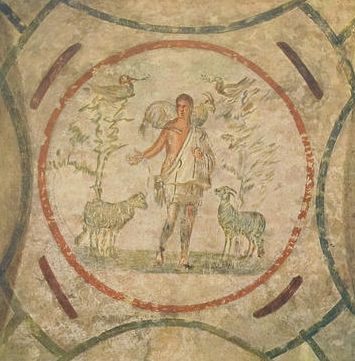Many of you know that
before I entered seminary I worked as a prison teacher. When I first started working there, a lot of
the other helping professionals in the prison recognized that there was
something about the culture of that place, the marbled unity of grotesque
beauty and darkness in search of light, that I needed to understand to be
fruitful there, and the only way they could explain it was through stories. This story’s from a prison chaplain. I never knew the inmate the story’s about,
but it’s a pithy way of getting across in one short graced conversation what I
saw so many times, on a much slower scale.
He was young, but a hulk of a man, apparently, intimidating. By which, I learnt, the chaplain meant both
that he looked intimidating, and that
he often went out of his way to intimidate people. He’d stand at the back of the chapel
throughout Mass, defiant. After several
weeks of this, the chaplain approached him and asked: “What’s your name?” “Striker,” came back the answer. “That’s not a name, that’s a committal
offense, a claim, a front. What’s your
name?” “González.” “OK, but I’m not going to call you by your
last name. That’s not how you were baptized.
What’s your name? What does your
momma call you?” The next answer, I
won’t repeat in church. That’s what his mother called him, something I won’t
repeat in church. “She’s mad with you a
lot, huh?” “Yeah. I’m bad.”
It wasn’t a confession, it wasn’t a boast; it was just a flat statement
of fact. “But, I bet that wasn’t what
she called you when you were a baby, huh?
What does your momma call you when she’s not mad with you?” “OK, my first name is Napoleón.” “Nice name.
But that’s not what I asked. What
does your momma call you when she’s not mad with you?” Out of a face, I came to know so well that
was about to erupt in something, you just didn’t know what, came: “Well,
sometimes… she’d call me Napito.”
“Napito. Can I call you
that?” I wonder how long since he’d
heard that. He didn’t say. He just replied, “Sure, padre. That would be chido.”
To be
called by the name our momma uses when she’s not mad with us… isn’t that what
we all want? To feel that safety, that
care and concern, that loving intimacy, to feel known and loved not for who we
are or what we’ve done (maybe even despite those things), but because of whose we are. God is the Good Shepherd who calls each of us,
his sheep, by name, and leads us out.
In the
ancient world, there was a name for shepherds who named their sheep: “poor.” It actually wasn’t that unusual for a poor
shepherd who only had a few sheep to give them names, and call them by
name. That’s how Jesus is identifying
himself here. He’s putting himself
squarely in the company of the poor shepherds, the ones who valued each sheep
with immensely personal care and attention, who knew them by name. But, he’s not a poor shepherd. We read in Acts about one day when
three thousand sheep were added to his fold!
On a universal, grandiose, cosmic scale, the Creator of the Universe,
the pre-existent Word of God cares for us all, cares for each of us, with the
personal, loving intimacy of a poor shepherd with just a few sheep. He calls us each by the names our mommas use
when they’re not mad with us.
But Christ
has an intimacy to offer us that no shepherd, no matter how caring, could offer
his sheep. For while an expert shepherd might know a huge amount about sheep,
sheep in general, and through attentiveness, to their own sheep in particular,
their knowledge is knowledge from the outside. Close outside, perhaps, but
outside, still. No other shepherd has ever been a sheep. The call of Christ,
being called by our own name strikes us as revolutionarily intimate, and we’re
changed by that, just as Striker melted when called Napito. We hear that call not to statically bask in
our Father’s love, but to be called out of our fear, our isolation, to leave
behind the stone wall of the sheepfold that was separating us from darkness and
follow behind the shepherd who calls us and leads us out, beyond the fold. As Peter’s letter puts it, he left us an
example that we should follow in his footsteps.
What Christ
does, by bringing God’s powerful shepherdly love to intimate union with human
sheepish flesh, is to forge a path that we can follow him on, back to the lives
of loving integrity that we’ve strayed from. Think of a child following behind
a parent through deep snow, too deep for the child to walk though alone, but as
the parent walks, the footprints clear the way for the journey home. Following
in Christ’s footprints aren’t some kind of trade (put up with this much suffering
and you get heaven); they’re pointers to a life-line, to acts of love, intimate
and powerful, in which we are called to participate, to be formed for the kind
of love that heaven is. Called to participate, called by name, by the name our
momma calls us when she’s not mad with us.

No comments:
Post a Comment